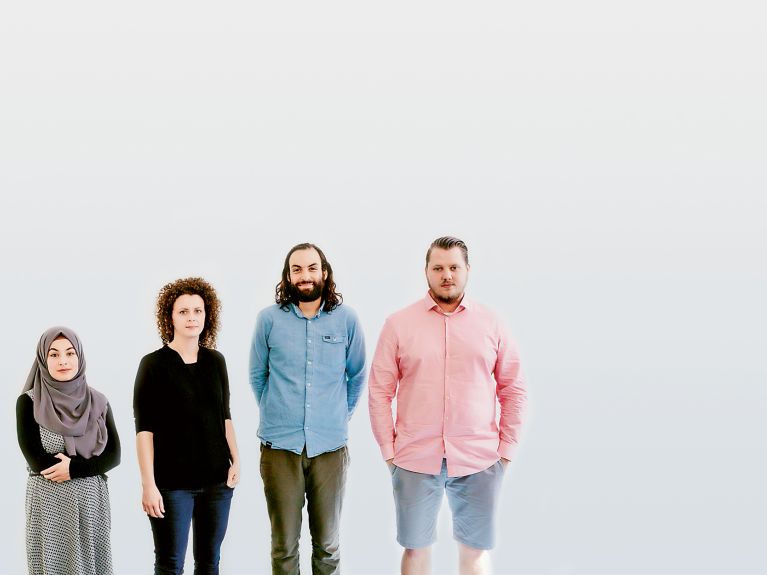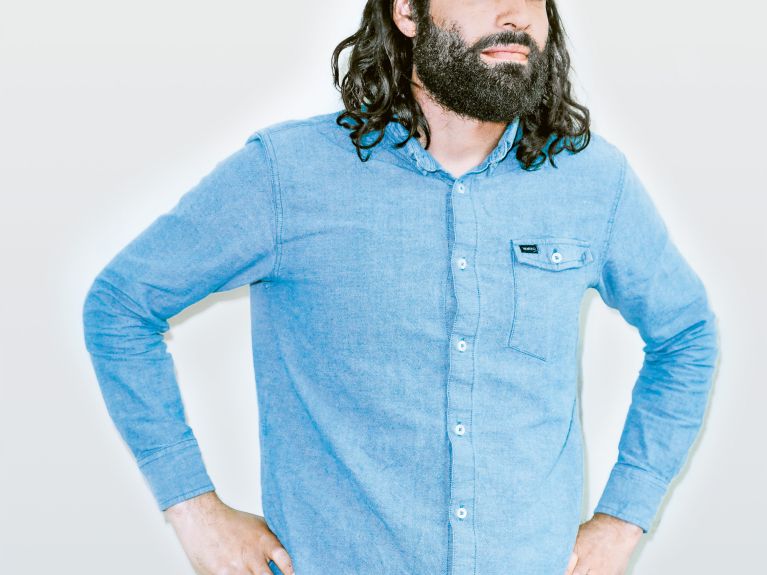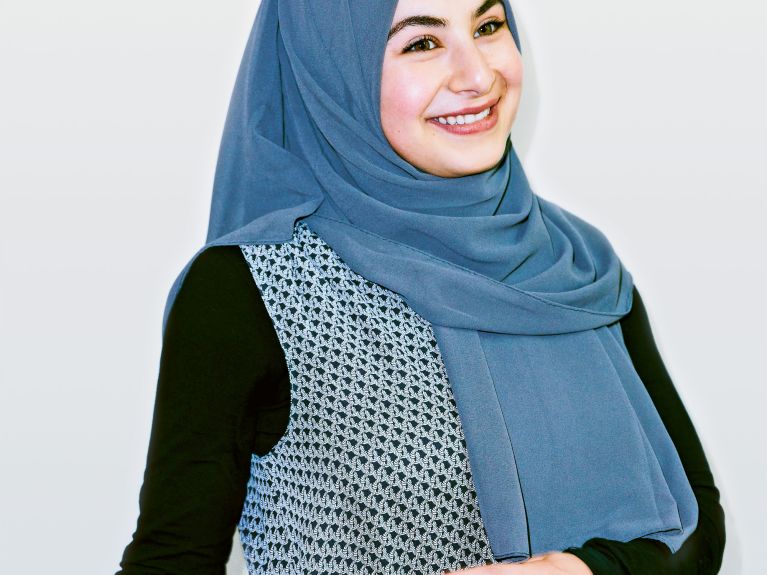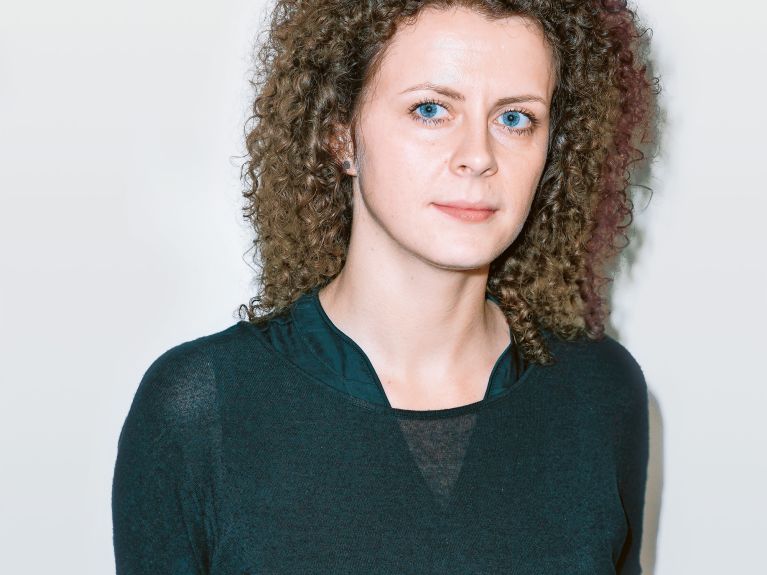Discussion about religion and conflicts
Religion and conflicts in everyday life in Germany: four people for whom religion plays a major role in their lives, two hours of discussion – and, at the end, a cautious insight

If you want to practise a religion in Germany, you have the Basic Law on your side. It states that freedom of faith is inviolable and that the undisturbed practice of religion is guaranteed. But what does that mean in everyday life? Time and again conflicts occur that are triggered – not necessarily caused – by religion. Sometimes they are about the dancing ban on Good Friday, sometimes about headscarves, sometimes about a Jewish boy who is mobbed in his class. Every time, the big question that arises is how can people of different religions live together in peace and friendship. Unfortunately, the big answer is still missing. But we can attempt to find many small answers. That is why one late summer day in Berlin four people have come together for whom religion plays a major role in their lives: a former Salafi, a Muslima, an employee of the Jewish Forum for Democracy and against Anti-Semitism and a
researcher who is studying the opportunities and limits of interfaith dialogue.
There’s a large table, coffee and two hours’ time for discussion – not much for a topic that people have been arguing about for millennia. But it’s enough, at least, to exchange views. The four participants are meeting one another for the first time. They eye one another up inquisitively, a little timidly.
To start with, they need to clarify how you can recognise a religious conflict in the first place. After all, if a Christian and a Muslim or a Jew and a Buddhist become tangled up in a dispute about an everyday problem, often religion doesn’t have anything to do with it at all. It is different when people get into difficulties because of their religion. In recent months there have been several controversial incidents in Germany. In refugee centres, for example, Christians were beaten up by Muslims because they were Christians. Pigs’ heads have been placed in locations where mosques are planned, and Israeli tourists were insulted in Berlin.
The only one in the discussion who can immediately be identified as the member of a particular religion is the Muslima Hawa Öruc. The 26-year-old student, who comes from a Kurdish family, decided four years ago to wear a headscarf. Does she have the impression that people react to this piece of clothing? Öruc says: “Yes, I feel the exclusion massively, especially since the rise of the Pegida movement and since the AfD entered 13 state parliaments.” Supporters of the Islamophobic Pegida movement have been organising demonstrations in Dresden since 2014; the AfD is a right-wing populist party that was founded in 2013.
Subject of dispute: headscarf
Recently, when Öruc travelled by train, she was vigorously pushed by a man as she was getting off. Öruc assumes that he felt provoked by her headscarf. Something like that had never happened to her when she didn’t wear one. However, she also feels excluded by the way the headscarf is discussed in society. “Something I use to define my commitment is immediately described as a uniform.” But in a pejorative way. “Anyone who feels he is a member of a football club is allowed to show his colours and shout every weekend: ‘I belong to this team and I wear this uniform because I want to!’ That doesn’t have the same negative connotations.”
Now Dominic Schmitz joins in: “That’s logical. Nobody blows himself up for Schalke.” Schmitz used to be a Salafi, one of roughly 10,000 in Germany. FC Schalke 04 is a Bundesliga soccer club in his home region. In 2009 the club had to deal with a religiously charged debate about the club anthem, which contained the words: “Muhammad was a prophet who understood nothing about football.” An Islamic studies scholar came to the view that the lines were not Islamophobic and recommended they be seen with “a little more humour and moderation”. Dominic Schmitz has already experienced religious conflicts from many perspectives and today warns vigorously against Islamism. For several years it was part of his everyday life that he mistrusted others and they him – because of the way he and they practised their religion. In the meantime he describes himself simply as “Dominic – that includes being a Christian a little, being a Muslim a little, philosophy, doubts”.
Name calling at school
A discussion now unfolds between Schmitz and Öruc that touches on the Islamist preacher Sven Lau, art and music in Islam and the question of how some Muslims view freedom of opinion, for example in connection with cartoons. Muhammad cartoons constantly spark conflicts between Muslims and people of other faiths. It becomes clear: Schmitz sees dangers in Islam, where Öruc sees none. Both speak very politely to one another, but you notice they are agitated. It has already become evident here at the coffee table that religious conflicts are so difficult to resolve because they centre on the very core of what people believe. They are not about any old thing, but everything. When Schmitz recites a sentence he describes as a problematical verse of the Quran, the discussion comes to a halt.
Until now Tabea Adler of the Jewish Forum for Democracy and against Anti-Semitism has listened silently. Yet she also has a great deal to say about religious conflicts. In her estimation, many conflicts only apparently have something to do with religion. “When someone approaches a man about his kippah, there are often very different factors behind this. The main thing is not that he wants to know something about the religion, but that he has a cultural image in his head.” And: “It frequently happens that Jews are made responsible for Israel’s policy.” That is pretty irrational, she feels.
And it can get even cruder. Today the word “Jew” is increasingly often used as an insult among school students. Furthermore, it is not a matter of naming a supposed Jew as such, but just name calling. A survey among Berlin teachers commissioned by the American Jewish Committee found that this insult is meanwhile “routine” in school playgrounds. Many Jews in Germany are intimidated by this development, which is not only restricted to playgrounds. “I know people who would like to wear a kippah, but don’t do so in order to avoid hostility,” reports Hawa Öruc.
The researcher sitting at the table, Kim David Amon, knows better than others which religious conflicts especially concern young people. He is examining how people talk about that in religious education classes. In Hamburg, where he works, religious education is different from in other German states because students from different religions take part together. He describes how in classes with a Muslim majority there are often a few students “who forge ahead with a strong opinion and attain something like religious hegemony”. A diversity of viewpoints is “often not very strong”, even though it does actually exist, as interviews show.
Workshops and talks
One subject on which young people of different religions have conflicting views is homosexuality. Dominic Schmitz explains that Muslim school students often support the viewpoint that homosexuality is something bad, something despicable. They told him that if their sons were gay they would throw them out. Tabea Adler from the Jewish Forum is also aware of this view. She chairs workshops in refugee accommodation where the main target group is youngsters and young adults between 14 and 18 years of age. “On the subject of homosexuality many say: ‘We don’t have that.’ And then a discussion starts. We say: ‘You haven’t seen that yet because it is prohibited in your homeland. That doesn’t mean that it doesn’t exist.’ I hope that we have set them thinking.”
The four participants have now come to the question of how conflicts can be resolved. Schmitz also wants to give school students food for thought. He tells them: “What you believe is up to you. But your homosexual son is not that way to annoy you or Allah.” But they then say: “That is a test. Allah is testing them.” He answers: “But that isn’t fair. What kind of God looks at that and says to himself: ‘Great, he’s doing that for me; that’s a good believer.” Schmitz hopes that students then begin to think about it. He doesn’t believe he can immediately persuade them.
Interested in dialogue
Researcher Amon is optimistic that students are basically interested in exchange. Adler, too, has found that the young people she speaks to are not closed off. Does she have problems, for example, when she goes to young Muslims as an employee of the Jewish Forum? “We have never experienced a fundamentally negative attitude in the centres. Concerns are expressed more by colleagues. Some are afraid that it is too provocative. But the young people do not ask explicitly whether I’m a Jew. Very few do that.” By the way, the question would not disturb her: “I think that is quite legitimate. What disturbs me more is that people are so diffident and so afraid, as if it were something bad to ask about that.”
Amon points out that it is not only Muslim students who find dialogue on religion important. However: “Many young people who would relate to another religion lack the ability to speak about religious ideas or what drives us in our innermost selves.” There is a psychological barrier against dialogue on this subject – discussing religion is actually also a matter of practice. If you haven’t done it very often, you tend to hold back because you don’t want to offend anyone, or you’re afraid of rubbing someone up the wrong way. Adler, Schmitz, Öruc and Amon have had a lot of practice. They don’t interrupt one another, listen attentively and give detailed explanations.
The time for discussion has come to an end. The photographer takes pictures. When he’s finished, the four participants remain a while and carry on talking. Some for two hours. It would appear that this is at least one thing on which they all agree: talking is worthwhile.

The 32-year-old researcher works for the Academy of World Religions at the University of Hamburg. For a research project on Religion and Dialogue in Modern Societies, which is funded by the Federal Ministry of Education and Research (BMBF), he is investigating how people of different religions make contact with one another. His special interest is the interaction of students and teachers in the classroom.
awr.uni-hamburg.de
Many lack the ability to speak about religion

Among other things, the 26-year-old student is actively involved in i,Slam, a Muslim poetry slam, and in the Kreuzberg Initiative against Anti-Semitism (KIGA) in Berlin. In addition, she is studying physics and embedded systems. She comes from a Kurdish family and has always been a Muslima. However, she only began wearing a headscarf four years ago.
kiga-berlin.org
My headscarf is described as a uniform

The 29 year old is a former member of the Salafi scene. Born and brought up in North Rhine-Westphalia, he converted to Islam at the age of 17. He worked with radical preachers like Sven Lau and made Islamist propaganda videos. After six years he managed to break away. He wrote a book about his time with the radicals and talks to school students about his experiences.
bit.ly/2eUwSZf
I tell young people: ‘Be yourself – and you can be everything. Please do not hate someone because he is different’

The 31 year old works at the Jewish Forum for Democracy and against Anti-Semitism in Berlin. The association advises and supports people who have been the subject of anti-Semitic abuse or attacks. Adler is currently active in a project for refugees and their helpers which aims to enable them, among other things, to deal with racism and religious conflicts. She is a Protestant.
jfda.de
The young people don’t explicitly ask whether I’m Jewish